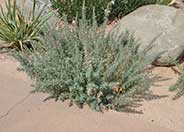
Common name:California Fuchsia, Zauschneria
Botanical name:Epilobium canum
The California fuchsia is a perennial with dense, narrow, green gray foliage and red orange summer flowers. The growth habit of this plant is sprawling and low. The California fuchsia is native to California, is drought tolerant, and attracts hummingbirds.
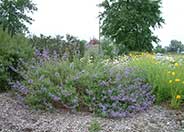
Common name:Blue Sage
Botanical name:Salvia 'Allen Chickering'
The Allen Chickering Sage is a perennial shrub that grows 2'-5' high and 2'-4' wide. It has blue flowers that bloom in the spring and summer. This shrub is native to California and is drought tolerant.
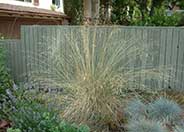
Common name:California Fescue
Botanical name:Festuca californica
The California Fescue is a cool season bunchgrass with blue green blades that reach 2'-5' high and 3' wide. Foliage arches gracefully upwards and outwards. Flower spikes reach 3' above the leaves. Plant in full sun or partial shade. It makes a great companion plant to oak trees and is handsome as a backdrop behind lower growing grasses for a meadow look. The California fescue is native to California and is a beneficial insect plant.
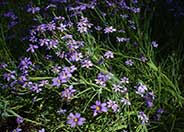
Common name:Blue-Eyed Grass
Botanical name:Sisyrinchium bellum
Following winter rains, this grassy perennial brings a soft texture back into the garden. It produces an abundance of small, blue purple flowers which have a long bloom.
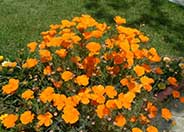
Common name:California Poppy, Golden Poppy
Botanical name:Eschscholzia californica
This small annual (sometimes acts as a perennial) plant will grow to less than 1' tall and has light, small blue green leaves with gold and orange flowers that bloom in spring and summer.
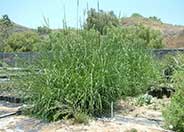
Common name:Giant Wild Rye
Botanical name:Leymus condensatus
This prominent, tall native grass does not make its way into traditional residential landscapes but can be used very effectively in a native or natural garden. It reaches heights of 6'-8' when blooming and will clump to 4'-5' wide. It requires supplemental water to remain green in the summer. Too much water will cause the grass to decline significantly. It can be pruned annually to promote new, more attractive growth. Tall grasses are highly combustible.
Permeable Surfaces
If you have impermeable paving that you would like to make permeable, there are two main methods for doing so:
1. Break up hard paved surfaces to create spaces for water to seep through.
2. Remove and replace the surfaces with permeable paving.
Click in the green box for more information
| Designer: | Native Garden Gone Wild |
Photographer: GardenSoft |
Soils and Compost:
Physical weed control, including mulching, or hand removal protects the watershed from harmful chemicals.
Water Saving Tip:
Mulching and adding compost to soil can minimize evaporation and help soil absorb and store water.
Integrated Pest Management:
Develop healthy soil for plants that are vigorous and naturally pest-resistant.

